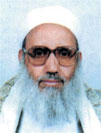U.S. judge sentences Yemeni to 75 years
By
Charlotte Kates
New York
Published Aug 2, 2005 10:31 PM
The harsh sentence imposed here July 28 on a Yemeni religious leader grabbed by U.S. agents in Europe illustrates clearly the political nature of the persecution of Sheik Mohammed al-Moayad and his assistant and co-defendant, Mohammed Zayad. It also shows the lengths to which the U.S. government will go to justify its campaign of intimidation and harassment of Muslim and Arab people.
|
Sheik Mohammed
Ali Hassan
al-Moayad
|
Al-Moayad, who had been entrapped in Germany by U.S. FBI agents and extradited to the United States in 2003, was sentenced to a total of 75 years in prison and a fine of $1.25 million. During the sentencing hearing, Judge Sterling Johnson openly displayed contempt for the elderly sheik. He strolled behind the bench as al-Moayad was explaining his charitable activities and the fact that he had never worked to harm the people of the U.S., but rather to help his fellow Arabs in Yemen and in Palestine. As defense attorney William Goodman was describing why the organization Hamas, which administers charities for Palestinian refugees, is so popular in the Arab world, the judge interrupted him to declare the group "evil."
In justifying the extreme sentence, Johnson referred to material support for al-Qaeda--despite the fact that al-Moayad had been acquitted of those charges at trial. He also quoted statements by disgraced FBI informer Mohamed Alanssi--but Alanssi had never appeared in the courtroom, because even the prosecution viewed him as a tainted, disreputable witness.
The judge engaged in a detailed chronology of the events of Sept. 11, 2001. While admitting that al-Moayad had neither been accused nor convicted of any involvement with those attacks, he declared that it was, nevertheless, relevant to sentencing.
Judge Johnson sentenced al-Moayad to the maximum penalty, 15 years, on all five counts for which he was convicted, for a total of 15 years' imprisonment. He then added a $250,000 fine for each charge, for a total of $1.25 million.
The behavior of the judge and prosecutors in this case clearly revealed that it was a political case meant to put all activity in support of Palestinian and Arab causes--in the U.S. and internationally--at risk for U.S. government persecution and repression.
Helped Yemeni, Palestinian children
Sheikh al-Moayad had directed various charitable institutions in Yemen, including a bakery and a grocery that distributed food to the poor, schools for boys and girls, a computer center and a free medical clinic. His charitable work extended to supporting not only Yemenis, but his fellow Arabs in Palestine, including raising funds for schools, school supplies and other provisions for Palestinian children.
Although a well-known figure in Yemen, he had not been targeted by the Yemeni government or the U.S. government for his activities until a Yemeni informer and con man, Mohamed Alanssi, introduced himself to the FBI in November 2001 with what testimony and later press coverage would reveal to be promises of spectacular information in exchange for financial compensation.
Alanssi, visiting Yemen on behalf of the FBI, eventually lured al-Moayad and Zayad to Germany to meet with a supposed wealthy would-be contributor. He turned out to be an undercover FBI agent.
Al-Moayad and Zayad were arrested and flown to the United States amid spectacular promises of the capture of people responsible for providing millions in funding to Al-Qaeda. In the meantime, Alanssi set himself on fire in front of the White House on Nov. 15, 2004, demanding more money from the FBI for his testimony. He never testified from the stand in this case.
Despite never having entered the U.S. before, al-Moayad and Zayad were placed on trial under U.S. laws. Even in this repressive climate, they were acquitted of charges of material support to al-Qaeda, but were convicted of materially supporting Hamas--in Palestine--and various conspiracy charges.
In their home country of Yemen, Hamas is a completely legal organization. It is well-known and respected throughout the Arab world for its role and participation in the Palestinian resistance.
Thus, Arab support for Palestine--in the Arab world itself--was criminalized under U.S. law in this trial.
This case indicates a dangerous precedent by which activists from around the world can be kidnapped and brought to trial in the U.S. In this, it is similar to the case of Colombian rebel leader Ricardo Palmera.
In addition, it comes at a time of increased repression of Arab and Muslim activists in the U.S. The trial of Professor Sami al-Arian in Florida continues and the Los Angeles--Palestinians facing deportation since 1984 for purely political activities--are being prosecuted once more in California.
Al-Moayad's attorneys plan to appeal both his conviction and the sentence. This case will need the support of all who are concerned about political repression and political freedom in the U.S. and internationally.
Charlotte Kates is an activist with New Jersey Solidarity-Activists for the Liberation of Palestine and Al-Awda New York.
Articles copyright 1995-2012 Workers World.
Verbatim copying and distribution of this entire article is permitted in any medium without royalty provided this notice is preserved.
Workers World, 55 W. 17 St., NY, NY 10011
Email:
[email protected]
Subscribe
[email protected]
Support independent news
DONATE


